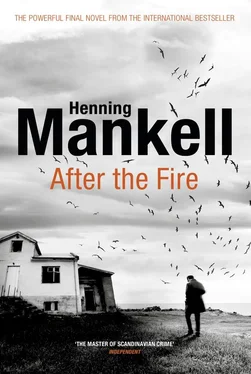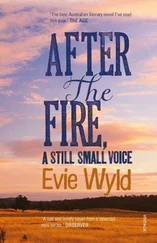I tottered up to the caravan. Before I lay down I did something I never usually do.
I locked the door.
I was woken by the sound of someone knocking.
It was the second day after the coastguard had found me drifting in my boat. I had carried on drinking when I’d got back to the island, and hadn’t begun to sober up until the following day. I was constantly expecting the police to come and pick me up.
The occasions in my life when I have drunk heavily have been few and far between, and I have always been alone when they happened. They follow the same path: I drink, I remain silent apart from yelling into the emptiness now and again. I fall asleep easily but usually wake up after a short time.
When I had started to sober up and felt the remorse gradually ebbing away, I went up to the bench on the hill with my binoculars. I looked over at the tent on the skerry, but there was no sign of anyone. However, I couldn’t be sure that the mysterious visitor hadn’t been there.
I noticed that I was listening for the sound of an engine the whole time. There wasn’t a breath of wind. I made myself something to eat when I remembered, but I hardly touched it and threw it to the gulls on the rock down by the boathouse where my grandfather used to sit mending his eel traps when I was a child. Slowly my thoughts returned to the night I had spent in Lisa Modin’s apartment.
The events to which the embroidered cloth bore witness, and the contents of the black bag, belonged to the past. It was seventy-five years since the war broke out, since the Nazi threat had seemed unstoppable. I was born after the war, Lisa Modin much later than me. Obviously there was something in her past that was still alive as far as she was concerned, but she didn’t have the items on display. It wasn’t something she wanted on show.
The most important question in my mind was of course the identity of the smiling man blowing cigarette smoke straight into the photographer’s eye. Who was Karl Madsen?
Remorse was replaced by depression and self-loathing. Every time I was overcome by those feelings I thought about my father and his many failures. I remembered him coming home after long shifts and immediately sitting down at the kitchen table, forcing my mother to listen to his complaints about all his difficult colleagues and the maître d’s, not to mention the diners he had to put up with. I never heard him accept responsibility for any tricky situation that had arisen; it was always the other person who had been in the wrong. When I was a child, I thought my father was an amazing man who never made any mistakes, but as time went on I realised that of course he was simply blaming someone else. That was also why he burdened himself with what sometimes seemed like a bottomless sorrow over a life that had turned out to be a failure.
My mother was his polar opposite. She was happy to take the blame for everything that happened in our home. If I came home with bad marks from school, it was her fault; she should have made sure I had peace and quiet to do my homework. If I got a nosebleed because I’d been fighting in the playground, she was responsible; she should have warned me about the boys who had attacked me.
I began my second day after my major drinking session by going down to the jetty and taking a dip in the ice-cold water. When I had rubbed myself dry I was even able to manage a substantial breakfast. Afterwards I poured the remains of the vodka down the sink but kept the cans of beer I hadn’t yet drunk.
In the afternoon I lay down for a sleep only to be woken by the sound of someone knocking. I opened the door to find Lisa Modin standing outside. She was dressed in the same way as on the day we went over to Vrångskär. She was pale and seemed nervous. I stepped aside and let her in.
‘How did you get here?’ I asked when she was sitting at the table. I had offered her the bed, which was more comfortable, but she chose the stool.
‘My editor has a small boat; I came on my own. I was afraid of running aground because I only knew the general direction, not how far away from the islands I needed to stay, but it was fine. I hope I’m not disturbing you.’
‘You’re not disturbing me. Can I get you anything?’
‘Tea?’
We drank tea. I didn’t like the taste; Lisa didn’t seem very keen either. I could tell from her face, but she didn’t say anything. I waited.
I had once been sent for by my senior consultant when I was a newly qualified doctor. I didn’t know why he wanted to see me, so I sat down and said nothing. The consultant, who was both stern and rather self-important, didn’t say anything either. We sat in silence for perhaps ten minutes, then he looked at me and thanked me for coming. When I mentioned this strange encounter to one of my contemporaries, he said I should have asked for a pay rise. That was why the consultant had sent for me. He knew I wasn’t happy, but he would never have started the conversation about my salary.
I topped up Lisa’s cup. She still didn’t say anything. I looked at her, remembering the night I had seen her in her bed.
‘I wasn’t lying,’ I said.
She looked questioningly at me.
‘I wasn’t snooping. I made a mistake in the night when I needed the toilet. I opened the wrong door, and then the wardrobe. I might have tripped. But I don’t read other people’s letters. I don’t poke around in other people’s belongings. Nor do I allow anyone to poke around in what is mine. Or was mine. Now my house has burned down, there’s nothing left.’
When I stopped speaking she looked at me for a long time, presumably trying to decide whether to believe me or not. Trusting what a person says is always a risk. The truth is always provisional, while lies are often solid.
‘I came here because I want to explain,’ she said. ‘At the moment I don’t care whether or not you got lost in the night. You’re wrong if you think I was trying to hide something.’
She got to her feet.
‘Can we go outside? It’s not raining or windy. I need air; it’s so cramped in here.’
I pulled on my wellingtons, grabbed my jacket and opened the door. The sun was shining; late autumn in the archipelago was still mild.
We walked around the island and eventually sat down on the bench at the top of the hill.
She began to talk. Her family came from Germany. Her grandmother Ulrike had married Karl Madsen, a member of the infamous Waffen-SS. He had belonged to one of the units responsible for appalling outrages in Poland while Ulrike had remained in Bremen. Lisa’s mother Roswita was born when the war was over, in the autumn of 1945, following Karl’s last visit home towards the end of 1944.
Ulrike, who had been born in 1917, died at the end of the 1970s. Until that day Roswita had believed that her father had died while defending Berlin, before the city fell in May 1945. However, as she went through everything her mother had left behind, she realised that Ulrike had lied to her. Karl Madsen had been lynched in Krakow a few months before the end of the war, hanged on a makeshift gallows in one of the city’s squares. He had been recognised because of his involvement in indescribably brutal actions during the conflict in Poland. There was no indication in Ulrike’s papers of what he had done, nor was there any explanation as to why the photograph of Karl Madsen had been taken somewhere on the Eastern Front. It seemed likely that he had fought on the front line for a short period; a soldier’s life was always full of gaps.
We set off for a brisk walk around the island again because Lisa was cold. When we got back to the bench, she continued her story.
‘I hardly remember my grandmother. I was only six or seven when she died. We were already living in Sweden by then; I was born in Uddevalla. My mother met a sailor called Lars Modin, who was fifteen years older than her and had moved here from Germany. Ulrike came too, with her few memories of my grandfather. My first recollections are of sunshine: warm summer days, a great stillness. My grandmother had her own apartment on the top floor of our house. She used to eat with us, but I never went up to visit her; she wanted peace and quiet. I was frightened of her — not because she was strict, but because she hardly ever spoke. I don’t remember her voice. Then she died, and my mother passed away too when I was thirteen. She was only forty, but she had a massive brain haemorrhage. I stayed with my father until I was twenty; he died a few years ago. A lovely old man who kept himself smart in his room in a care home. I didn’t learn much from Roswita about my German heritage; it was only when my father died that I found the items that you came across in my wardrobe. There isn’t really any more to say.’
Читать дальше












